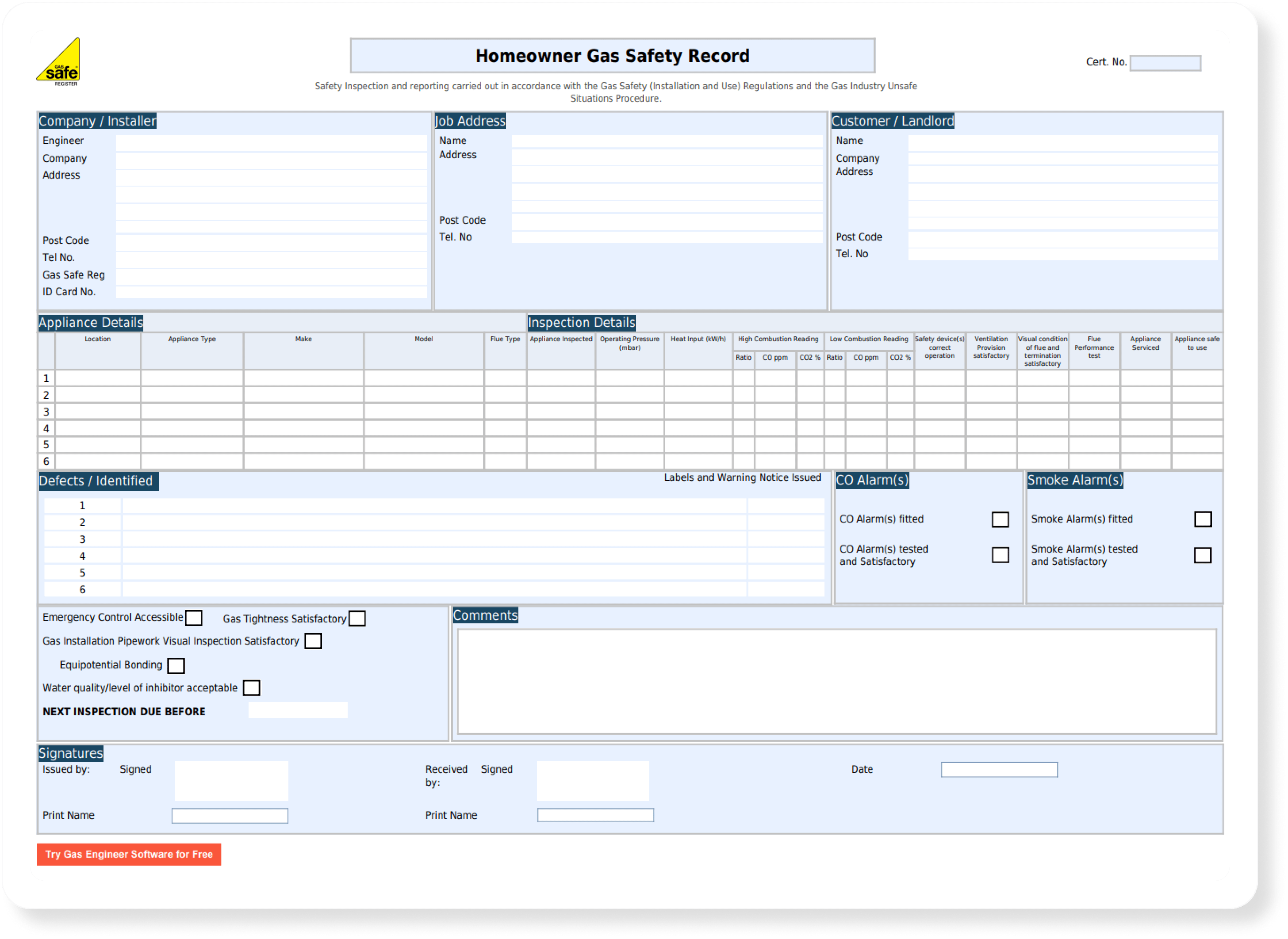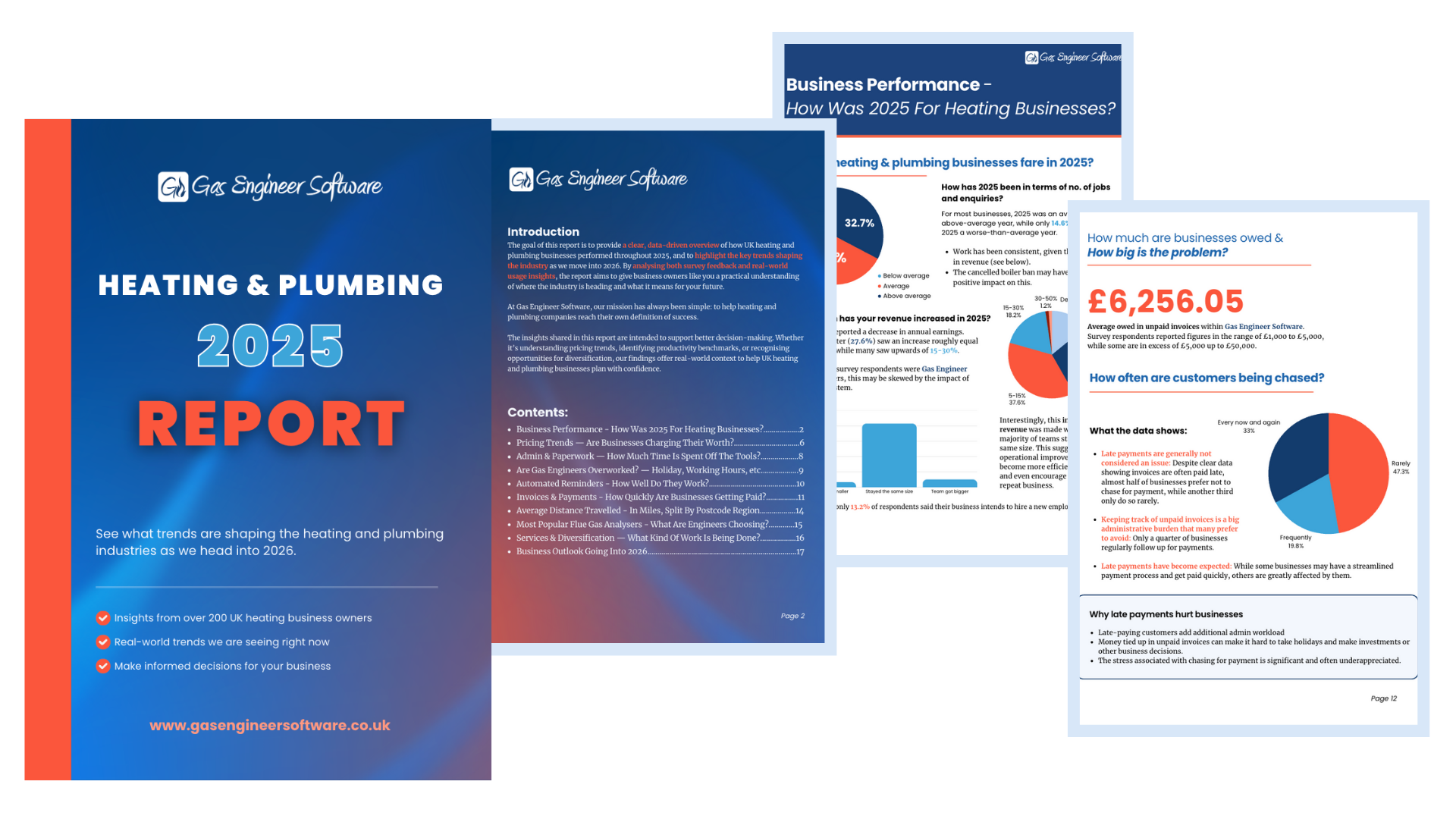How to Grow a Heating and Plumbing Business

Most heating and plumbing companies that want to grow hit the same wall. You want a reliable team, more predictable work, less admin, and a business that runs smoothly without you doing everything yourself.
But your business isn’t struggling because of a lack of customers. It’s struggling because there’s not enough time in the day.
Late-night quoting, piles of certificates, half-finished paperwork, jobs stored in your head, and a phone that never stops buzzing. Growth isn’t the issue: Capacity is.
Unlock your time, and growth will come naturally. Your new challenge then becomes managing this growth.
Growth Starts with Freeing up Your Time
When you’re running with a small team, your time is the most valuable resource in the business.
Yet most engineers spend huge chunks of it buried in admin: certificates, invoices, scheduling, and so on.
Then customers call. Engineers message. Quotes pile up. The working day ends, but your work doesn’t.
Freeing up even five to ten hours each week transforms how you operate. Suddenly you have the headspace to plan, improve, and grow — instead of firefighting.
Some ideas that will help you free up your time:
- Get someone to help with your admin workload, whether full or part-time.
- Work out what is the most impactful use of your time.
- Set up with a software system that can help you speed up parts of your job like certificate creation & storage, service reminders, scheduling and more.
All this might feel like an expense, but you’ll have more time to focus on the parts of your business that directly earn you money, and you’ll go from reacting to leading.
Core Strategies That Actually Grow a Plumbing & Heating Business
We’ve written a full guide on how to get more jobs, together with a PDF guide.
Here are the basics from that guide:
Strengthen your online presence
A polished Google Business Profile, clear website, local SEO, and good reviews help customers find you and trust you instantly.
Make it easy for customers to book you
People choose the company that replies first. A smooth booking process wins more work than a fancy advert.
Speed up your quote process
Fast quotes convert better. Fast follow-ups convert even more.
Drive repeat business
Annual service reminders, winter checks, landlord certificates — your existing customers are your most valuable source of work.
Build a reputation that sells for you
Professional documentation, good communication, and turning up on time do the heavy lifting.
Use paid marketing wisely
Google Ads and local ads can work well once your operations can handle an increase in demand.
As Soon as You Grow, Your Old Systems Start Breaking
Whenever you grow and start hiring new employees, everything changes. Whether it’s your 1st, 2nd, 3rd or 4th hire, your role starts to change as well.
- Your responsibilities change, and you know less about the day-to-day work.
- You might be doing less work on the tools.
- Scheduling and company organisation start to show their flaws as more work gets done.
The classic symptoms appear quickly:
- Jobs slip through the cracks.
- Customers start chasing you.
- Engineers ask the same questions repeatedly.
- The office can’t see what’s happening on site.
- You become the bottleneck in every decision.
These problems aren’t a sign you’re doing badly… in fact, they’re a sign you’re growing. But if you ignore them, they slow everything down, and the momentum starts turning into stress.
Sustainable Growth Comes from Strengthening Every Pillar Evenly
There’s a common myth that marketing is the answer to growth. Marketing is important — but it’s only one part of the puzzle.
A heating and plumbing business grows sustainably when all the pillars rise together:
- Sales & marketing help you find more customers
- Customer service helps you retain your existing customers
- Your team helps you increase capacity and take on more work
- Finance and systems need to be upgraded and made more efficient
When one pillar lags, the whole business wobbles. Watch more on this topic:
Pillar 4 — Fix the Systems Behind Your Business So They Can Scale With You
When your team grows, your systems need to grow with them. This is where small heating and plumbing businesses either accelerate or stall.
Strong systems create clarity, speed, and confidence. They let you delegate tasks without constantly checking in, and they prevent missed jobs, scheduling mistakes, and forgotten invoices. They keep everyone (office and field) working from the same information.
- Industry-specific job management
- Job history and customer history stored in one place
- Fast certificates and accurate records
- Automated reminders that generate repeat work
- Quotes and invoices generated quickly and without errors
- Smooth scheduling even as your team expands
- Reduced admin time across the board
A system like Gas Engineer Software becomes the backbone of the business — the engine that stops growing pains from turning into growth barriers.
To grow a heating and plumbing business, start with time.
Growing a heating and plumbing business is possible for any business owner. The trick is doing it in the right order and starting with the right solutions.
If you want to try Gas Engineer Software, claim your 7-day free trial below:


